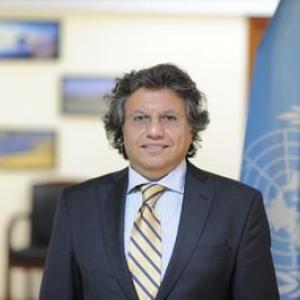Amid ongoing protests and violence, UN urges stepped up efforts to break political deadlock
30 January 2020
“The continuing loss of young lives and the daily bloodshed is intolerable. At least 467 protesters have been killed and over 9,000 injured since 1 October,” lamented the Special Representative.
Baghdad, 30 January 2020 – With ongoing violence and rising casualties in the context of protests and ahead of further planned demonstrations, the Special Representative of the Secretary-General for Iraq, Jeanine Hennis-Plasschaert, is urging stepped up efforts to break the political deadlock and press ahead with substantial reforms, warning that the use of force costs precious lives and will not end the crisis.
“The continuing loss of young lives and the daily bloodshed is intolerable. At least 467 protesters have been killed and over 9,000 injured since 1 October,” lamented the Special Representative.
“A recent increase in the use of live ammunition by security forces, reported shootings by unidentified gunmen at protesters and the continued targeted killing of demonstrators and human rights defenders are alarming. It is imperative that the Iraqi authorities protect the rights of peaceful protesters and ensure that all use of force complies with international standards. Equally important is full accountability: the perpetrators of unlawful killings and attacks must be brought to justice.”
A climate of fear and distrust will bring nothing but further damage. Political action and progress in the search for solutions must replace indecisiveness to deliver on the many promises and intentions. Building resilience at the state and societal levels is the only way forward to draw the people out of despair and into renewed hope, the Special Representative emphasized.
“Many have sacrificed everything to have their voices heard. Solutions are urgently needed. Iraq cannot afford the ongoing violent oppression nor the political and economic paralysis.”
The Human Rights Office of the United Nations Assistance Mission for Iraq (UNAMI) has consistently monitored the human rights situation in the context of the demonstrations. Since the beginning of the protests in October, it issued three reports* documenting human rights violations in the periods from 1 October to 9 December and presenting recommendations to the authorities. Since 17 January, UNAMI has recorded at least 19 demonstrators killed and over 400 injured by security forces in Baghdad, Basra, Dhi Qar, Diyala, Diwaniya, Karbala and Wassit. Preliminary information attributes most deaths and injuries to the use of live ammunition and the impact of tear gas canisters, while additional injuries occurred as a result of security forces beating demonstrators with sticks. Most violence used by security forces occurred in the context of attempts to clear roadblocks or disperse demonstrators.
In Baghdad, efforts by security forces to clear the Mohamed Qassem highway and areas in the vicinity of Tahrir Square using live ammunition and tear gas resulted in at least 11 deaths and 53 injuries. In Nasiriya, Dhi Qar on 25 and 26 January, security forces fired live ammunition and tear gas canisters causing at least three deaths and injuring over 100 protesters. Similarly, in Basra, in the early morning of 25 January, security forces demolished more than 20 tents set up by protesters as part of a sit-in and forced the protesters out of the area. In Karbala, security forces also used violence against protesters, resulting in at least 4 deaths and injury to over 150 others. In Diyala, the use of live ammunition by security forces resulted in the first death attributed to this cause and context in the governorate and injured at least four others.
There were cases of unidentified armed men shooting protesters. This happened on four consecutive nights in Basra from 21 to 25 January, killing two protesters and injuring nine others. In Nasiriya, on the night of 26 to 27 January, a group of armed men of unclear affiliation shot live ammunition at protesters in Haboubi Square, killing at least one protester and injuring four more, and set fire to several protestor tents.
Targeted killings continue against demonstrators and activists. Since 1 October, at least 28 incidents have taken place in which persons associated with demonstrations, either as participants, journalists covering the protests or prominent activists, have been targeted by armed men or improvised explosive devices, resulting in 18 deaths and the injury of at least 13 others. The cases include the targeted killing of two Dijlah Television reporters in Basra on 10 January. In Missan alone, credible reports indicate seven incidents in which civil society activists were shot at by armed men, resulting in two deaths and the injury of five others.
UNAMI also continues to track and monitor reports of physical attacks against demonstrators, including stabbings, cases of missing demonstrators and activists, and incidents of threat and intimidation.
Stressing the futility of violence in responding to the protests, Special Representative Hennis-Plasschaert said all efforts should instead focus on how to fully implement reforms and initiate a constructive dialogue to tackle the country’s problems in a spirit of unity.
“It is high time to restore confidence by setting aside partisanship, acting in the interest of the country and its people. Hard work and goodwill gestures will resonate with the people, and will be met in kind, strengthening the country’s resilience as it seeks to emerge stronger from this crisis.”






